| Srl | Item |
| 1 |
ID:
116664
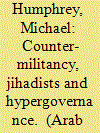

|
|
|
| 2 |
ID:
151200
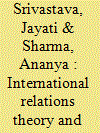

|
|
|
|
|
| Summary/Abstract |
Mainstream international relations theory is consumed by its proclivity towards order; the genesis of which has been attributed to its statist ontology. Such theorisations, by drawing binaries between order and disorder, either assume or normalise order or obfuscate and suggest ways of mitigating any kind of disorder. Paradoxically, questions about the foundational edifice of order are marked by silences. Within the context of world order, this obtains a theoretical framework that precludes any normative reflection on the making and unmaking of world order or the principles that sustain that order. The article looks at how different branches of international relations theory envisage world order and the silences embedded therein. Further, by locating order and disorder inhabiting the same reality along a continuum, alternative readings of world orders are drawn from the critical theoretical traditions in which various articulations of justice impart normative pillars to the world order.
|
|
|
|
|
|
|
|
|
|
|
|
|
|
|
|
| 3 |
ID:
193295
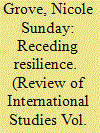

|
|
|
|
|
| Summary/Abstract |
The term disruption has been offered as both an ethos and set of practices framed as a broad response to all manner of social and political ills. This article offers a speculative reflection on disruption as a planetary mood, and the sensory qualities of a change in politics no longer defined by governance and what is governable, but by a series of continuous experiments hedged upon the creation of new geopolitical frontiers and life forms that position all matter and contingency towards a specific kind of value tied to chaos. In thinking about the kinds of authority and legitimacy being fashioned around visions of so-called disruptive futures, I draw on materially-grounded illustrations of disruptive dispositions to examine three different arrangements of affect, feeling, and intensity being animated to give disruption its power of transmissibility and adaptability, as well as its unintuitive emphasis on disorder and ‘breaking things’ as both a moral good and unconditional response to questions concerning global conflict, crises, and instability. Ultimately, disruption as a planetary mood draws on a libidinal economy that does not bend towards justice or equity, thus warning against misanthropic commitments to collapse and the consequences of investing in a world premised on an ethos of erasure.
|
|
|
|
|
|
|
|
|
|
|
|
|
|
|
|
| 4 |
ID:
190886
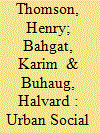

|
|
|
|
|
| Summary/Abstract |
The world’s population is increasingly concentrated in cities. Research on urbanization’s implications for peace and security has been hampered by a lack of comparable data on political mobilization and violence at the city level across space and through time, however. Urban Social Disorder 3.0 is a detailed event dataset covering 186 national capitals and major urban centers from 1960 to 2014. It includes 12 types of nonviolent and violent events, detailing the actors involved and their targets, start and end dates of each event, and the number of participants and deaths. We provide an overview of the main features of these data, and trends in urban social disorder across space and time. We demonstrate the utility of the dataset by analyzing the relationship between city size and the frequency of lethal disorder events. We find a positive relationship between city population and lethal urban social disorder, unlike previous studies. These new data raise promising avenues for future research on democratization; climate change and food security; and spillovers between different forms of mobilization and violence.
|
|
|
|
|
|
|
|
|
|
|
|
|
|
|
|
| 5 |
ID:
178969
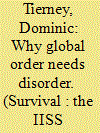

|
|
|
|
|
| Summary/Abstract |
Hegemonic-stability theorists see a single uncontested state as the key for global order, but it is precisely contestation that impels a powerful actor to build and sustain the liberal order.
|
|
|
|
|
|
|
|
|
|
|
|
|
|
|
|